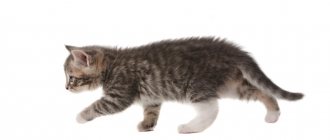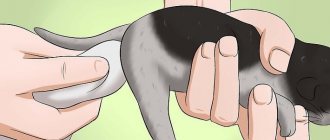Why is castration performed, at what age should a cat be castrated?
Castration is a fairly simple surgical operation during which the male gonads (testes) are removed.
The operation is performed on cats at the age of 9-12 months, after the completion of puberty. Until this age, furry pets do not have sexual instinct. Castration of a cat performed at an earlier age is fraught with serious consequences and complications. Until 8-9 months, the animal’s body is not fully formed. For example, a cat may have an underdeveloped urinary tract and inflammation often develops after castration. Any problems in the animal’s genitourinary tract will cause urethral obstruction, which can cause death.
Castration is carried out:
- to reduce the aggressiveness of cats;
- if a domestic cat constantly runs outside during the rut and fights with other males;
- for medical indications (scrotal injuries, congenital pathologies, orchitis);
- if the cat constantly yells, attracting cats, marks the territory (apartment, entrance).
The main purpose of castration, like sterilization, is to deprive animals of reproductive function and to correct behavior in cats that are too temperamental.
To reduce sexual desire, of course, you can use special medications and sedatives. But you need to take into account that such methods can harm the health of a mustachioed pet, for example, provoke hormonal imbalance. Therefore, the surgical method is more preferable.
In the apartment
An uncastrated cat living in an apartment causes a lot of inconvenience to its owner. If you are not going to castrate your pet, then be prepared to face problems such as:
- Tags. Most unneutered cats mark their territory in this way. This is the natural behavior of a sexually mature animal; it is useless to scold for it. Animals periodically mark the owner’s things, furniture and corners. The tags have a strong odor that is difficult to get rid of.
- Night screams. With a loud cry, the cat scares away rivals from the house and at the same time notifies the females of its presence.
- Aggression. With the onset of puberty, a previously affectionate, playful kitten can become an aggressive male. This is due to the action of testosterone, which encourages the cat to strive for leadership and conquer territory.
A castrated cat wants a cat - this also happens!
If a castrated cat continues to get excited at the sight of a female, shows anxiety, wants to constantly walk, leaves marks in the house or apartment, consult a veterinarian. The specialist will select hormonal medications and sedatives to correct your pet’s behavior.
If the cat gets very angry, shows aggression, begins to meow heart-rendingly or pesters females living in the same apartment, spray water on it or distract its attention with a treat or toy. This will not cause any harm to the pet, but will moderate its ardor.
As sedatives, cats can be given “Kot Bayun”, “Stop-stress”, “Xylazin”, “Fitex”, “Fospasin”. Regarding the choice of medications, dosages, and frequency of administration, consult your veterinarian.
If the operation is performed according to all the rules, there is no need to worry if the cat shows interest in females. Be patient. Over time, the behavior of a mustachioed pet stabilizes. The cat will become calmer, more peaceful, and hormonal levels will normalize. To make the male calm down faster, surround the cat with affection, care, and attention.
It is believed that after castration, a cat's interest in cats fades away within a few days and is never resumed. In the civilized world, it has long been customary to castrate cats that have no breeding value. However, sometimes it happens that after castration, a cat, to the great surprise of its owners, remains attracted to ladies of its own species.
The cat is clearly planning to do something with the kitty
There are many cases where cats that had been castrated for a long time again became gallant gentlemen when a fluffy person of the opposite sex appeared, or in the spring they behaved extremely depravedly with soft toys and the owner’s slippers.
The owners' reaction usually ranges from amazement to indignation at a poorly performed operation with claims against veterinarians.
However, whether such claims are justified is an ambiguous question.
sestratk (sestratk) wrote, 2017-06-22 19:27:00 sestratk sestratk 2017-06-22 19:27:00 It is absolutely normal for an uncastrated cat to mount a cat, since this is an instinct for procreation, which is caused by the action of hormones, produced in its testes. And if this behavior occurs in free-range conditions next to non-sterile cats, it will not surprise us at all.
However, when a neutered cat tries to mount a cat or even another cat living next to him, this behavior begins to cause concern for many owners. It upsets owners even more when a domestic neutered cat climbs astride the leg or arm of one of the owners and begins to make characteristic movements.
There are several reasons for this behavior
In most cats, this type of behavior stops after neutering. However, the behavior may not stop immediately after surgery. The wait can take weeks, and in some cases months or even years. After castration, there is a sharp decrease in testosterone levels, but testosterone, in some quantity, is still present in the cat’s blood, and how much there will be and how long it will remain in the body depends on each individual animal. Even after castration, the cat can retain the habit of doing cages, especially if it is provoked by the smell of an unsterile cat. A neutered cat may even display mating behavior on neutered cats. Animal psychologist Nikolai Dodman suggested that this may have something to do with the fact that the female does not smell like the male. Unneutered male cats can detect the scent of a cat in heat from a great distance. It is possible that a cat, even if she does not emit a cat odor while in heat, can emit enough of her everyday odor to provoke the cat to mount. That is, a cat can be triggered by the smell of even a neutered cat. Cats neutered at an older age may be more likely to display this behavior, since they have already mounted cats or objects under the influence of hormones, they remember this behavior scenario and try it repeat after castration, when hormones no longer affect them. High levels of social stress can trigger the behavior of mounting cats or objects, just as it can trigger marking. If you let your neutered cat free range, he may encounter an unneutered cat, and the smell of her may be enough to trigger this behavior. Some cats demonstrate mounting on pillows or toys, and awkward situations can occur when a cat lands on the arms or legs of a person, most often the owner. This behavior may indicate that the cat needs more attention and constructive ways to get rid of excess energy.
How to reduce unwanted behavior
Castration. If the cat is not neutered, this is obviously the first step you should take. Don't make the mistake of thinking that you just need to keep your cat away from cats. This is not only about eliminating the risk of unwanted pregnancy in cats, but also about reducing stress and creating a favorable environment for psychologically healthy behavior.
We suggest you read: How long does a cat’s pregnancy last, how to determine the period, how long after mating they give birth, and if the belly drops
Never punish. Never punish your cat for this behavior because it will only increase the stress level. A cat who is trying to get out of social stress will feel even more anxious if he is physically or verbally punished. Undesirable behavior from punishment will only increase, to the point that it can develop into aggression.
Expand your vertical territory. Increase your cat's sense of security by expanding his vertical territory. This can be done with the help of cat complexes, beds on windows, hammocks and shelves on the wall. Vertical territory allows cats to establish and maintain their status without resorting to aggression or other destructive methods such as cages. Being at a height is an important factor in a cat's status.
Provide an opportunity to sharpen claws. The point of the claws for a cat is of great importance and serves different purposes, and one of them is to mark its own territory. The point of the claws can help in maintaining the cat's high status. It also helps the cat relax to relieve stress.
Availability of resources. Provide multiple resources in multiple locations to prevent competition and conflicts for the best resource. This means that you should provide cats (if there are more than one) with more than one place to eat, more litter boxes than cats, and plenty of sleeping and hiding places to give the cats their own space. Introduce new cats into the family carefully. . Adding a new male cat can cause a variety of unwanted behaviors, including cages. To reduce the chances of this happening, ensure a gradual, positive introduction of the new cat into the family.
Increase the load. Increase physical and mental activity to give your cats healthy outlets for energy. Participate in interactive play sessions at least twice a day for half an hour for mature cats and at least two hours a day for young cats (up to three years old).
Working to improve relationships. In addition to the above, pay attention to the specific relationship dynamics between your cats so you can help them coexist peacefully.
Pay attention to warning signs
Pay attention to the cat's body language. There are many signs that your cat is beginning to display unwanted behavior such as mounting a person, another cat, or something. It all can start with a “milk step”, a characteristic purring, excessive caresses (for example, when a cat furiously rubs against objects or your hands). By catching the onset of unwanted behavior in the bud, you can provide your cat with better alternatives to release pent-up energy. Place interactive toys in every room so you can easily access them if you need to redirect your cat. Even throwing a stuffed mouse, ping pong ball, or other small toy may be enough to redirect it. Try to distract your cat before he acts out. When petting your cat, watch for signs that he may be getting overly excited. Your cat may have certain areas of his body that overstimulate him when stroked, so stick to areas that encourage relaxation. If your cat is becoming overstimulated because you're petting him for too long, be aware of this and stop petting him at the first sign of arousal. Tags: zoopsychology, cats, cages Good afternoon!!! We have a British shorthair cat, one year and a month old, vaccinated twice with Multifel-4 at the age of 2 and 3 months, wormed. Neutered at six and a half months. The doctor's note that the testes have formed is available in the veterinary passport for cats. After the castration operation there was a complication: suppuration. Doctors explained this by the summer heat and the fact that the cat itself could have brought the infection. The suppuration was washed out several times, now everything is fine. But something else worries me: the cat has been wanting a cat for 2 months now, has begun to meow often, is aggressive, tries to use a hand or toys as a “love object”... but there is no smell of urine, characteristic of uncastrated cats, and does not mark. Please tell me how this behavior can be explained?!!! Could the castration operation have been performed incorrectly? Why didn't the production of male sex hormones stop? What generally needs to be done in such cases?
We suggest you familiarize yourself with: Guinea Pig Diseases symptoms treatment medications causes of appearance
Recently I read about such a pathology as a cat - cryptorchid, in which one testicle remains in the peritoneum. Very worried. Please help, thanks in advance!!! fixxer added January 18, 2012, 5:06 pm Good afternoon!!! We have a British shorthair cat, one year and a month old, vaccinated twice with Multifel-4 at the age of 2 and 3 months, wormed.
Neutered at six and a half months. The doctor's note that the testes have formed is available in the veterinary passport for cats. After the castration operation there was a complication: suppuration. Doctors explained this by the summer heat and the fact that the cat itself could have brought the infection. The suppuration was washed out several times, now everything is fine.
But something else worries me: the cat has been wanting a cat for 2 months now, has begun to meow often, is aggressive, tries to use a hand or toys as a “love object”... but there is no smell of urine, characteristic of uncastrated cats, and does not mark. Please tell me how this behavior can be explained?!!! Could the castration operation have been performed incorrectly? Why didn't the production of male sex hormones stop? What generally needs to be done in such cases?
Castration and sexual desire
Many owners believe that after castration a cat should not show interest in individuals of the opposite sex. In general, this is true, and after removal of the testes, males do not experience attraction to females. But there are also exceptions. Owners notice that some cats' behavior remains the same as before castration. Let's try to figure out why the cat continues to get excited.
As already noted, according to veterinarians, it is best to castrate cats at the age of 8-10 months. If the cat tasted all the delights of sexual life before the operation and had contact with females, the body begins to produce sex hormones. Moreover, not only the testicles are responsible for their production, but also the adrenal glands and the pituitary gland, which, remembering the sensations received, synthesizes the necessary substances. This is why castrated cats continue to want cats and try to mate with them.
Even if castration is carried out at 8-10 months, in young males after castration the body, in particular the adrenal glands, will produce testosterone for some time. It is this hormone that is responsible for the sexual desire of males, so for several months the pet will be interested in individuals of the opposite sex.
Another reason for this behavior of males can be called too early castration or a mistake by a veterinarian. During an operation performed at an early age, due to the incompetence of the surgeon, part of the testis may be preserved, which will produce sex hormones.
In addition, the veterinarian, due to inattention or inexperience, may not inform the owners that one testicle remains in the peritoneum (cryptorchidism). Therefore, if you decide to castrate a cat, do not skimp on the procedure; trust your pet only to experienced veterinarians with a good reputation.
Many people who keep cats think that once their pet undergoes castration surgery, it will never show sexual desire again. But sometimes the opposite happens.
Consider three reasons.
Mating cats
This means that he will continue to trample, yell and mark his territory. This behavior is directly related to the fact that cats, who have already experienced satisfaction from intimacy, continue to produce sex hormones after castration, although not only in the genitals, but also in some parts of the brain.
In this complex process, the main role is played by the pituitary gland (an important gland in the brain), which, of course, is not removed during castration.
Cryptorchidism in a cat
This also happens during home surgery. About 2% of cats are cryptorchid: one testis is located in the abdominal cavity or under the skin, which means it does not extend into the scrotum. In this case, removal of the testicle is carried out using the method of abdominal surgery.
An additional incision is made to remove it. An experienced veterinarian can already identify the presence of cryptorchidism during examination, offering options for solving this problem.
An unscrupulous doctor can also see the presence of pathology, but will remain silent about it so as not to lose money. The veterinarian will place clamps on one testicle, and the other will function safely. And the owners, upon arriving home, will be perplexed why their cat continues to trample and get excited.
To avoid such problems, always contact only trusted clinics where your acquaintances or friends have already taken their pets and were satisfied.
Not much time has passed since the operation
Often this period lasts no more than three weeks. But sometimes this process drags on for several months. However, there is no need to worry, because every day your sexual desire will manifest itself less and less.
We suggest you read: The calmest cat breeds for apartments
Diseases
Unneutered cats are susceptible to the following diseases:
- Prostatitis is an inflammation of the prostate gland that occurs due to the penetration of pathogenic microorganisms into the prostate tissue.
- Diseases of the urinary system. Among them: urolithiasis;
- urocystitis (inflammation of the bladder);
- nephrosis;
- nephritis;
- pyelonephritis.
Castration will greatly reduce the risk of these diseases.
Thus, surgery is the safest and most humane way to solve all problems associated with cat behavior.
Other reasons
So, why does your cat continue to “stomp” after other types of castration? Most likely, the factors are the same - either there are still sex hormones in his fatty tissue, or a small amount of testosterone is produced somewhere in your pet's body. Measures to eliminate this condition are the same as those we have already discussed above.
But! With chemical castration, other situations occur. If the sclerotizing drug was introduced and distributed unevenly within the tissues of the testis, part of the organ may remain in working condition. Simply put, the testicle (or both) will continue to secrete testosterone, as a result of which the cat will again begin to show interest in cats. Elimination of this cause is surgical castration.
Cat owners often prefer vasectomy and chemical sterilization. In the first case, the testes are not removed, but only the spermatic cord is ligated. Despite the low-traumatic nature of this technique, this procedure is not very effective and does not give long-lasting results. After some time, in any case, sooner or later, males will manifest sexual instincts and the only way out is to carry out a repeat operation, complete castration.
A castrated cat wants a cat - this also happens!
fixxerAdded 2012-01-18 17:06:00The question was asked in the “Question - Answer” section on
Undoubtedly, most people experience feelings of tenderness and delight when they see little kittens. But when purchasing a cat, some owners do not want to listen to its night cries or have offspring every year. In addition, marking territory with a pungent odor, inviting meows, aggressiveness and estrus also do not add joy to a person.
Often, in order to make the process of breeding a pet impossible, owners decide to castrate or sterilize it. But it happens that a neutered cat still wants a cat, and a sterilized cat wants a cat. Why is this happening? After all, many owners are confident that after this operation their pet will never again show signs of sexual desire.
To understand why a cat wants a cat after sterilization or a castrated cat wants a cat, you should understand when castration needs to be performed and what the essence of this operation is.
During castration of cats, incisions are made in the skin of the scrotum in two places, silk clamps are applied to the spermatic cords, after which the testes themselves are removed. For cats, neutering involves removing the ovaries and sometimes the uterus. Castration surgery for cats is much simpler than sterilization for cats, because their genitals are external and, as a rule, no stitches are required.
Castration should be carried out on cats and female cats from the age of 10 months. Some veterinary clinics perform this operation as early as 8 months of age. It should be remembered that the operation must be carried out before the first mating of animals, otherwise a castrated cat will still want a cat, and a sterilized cat will want a cat.
The fact is that pets that already had a “love affair” before the operation produced sex hormones, which are produced not only by the genitals, but also by the pituitary gland, which, of course, are not removed during the operation. It is for this reason that the pituitary gland remembers the sexual instinct, and even a castrated cat wants a cat.
It should also be remembered that very early castration can lead to a number of serious health problems. For example, a cat’s urethra remains underdeveloped, that is, narrow. For this reason, any problems in the urinary system will lead to urethral obstruction. That is, choosing the right time for the operation is very important, since a castrated cat will still want a cat or the urethra will remain underdeveloped.
As you can see, an incorrectly selected period for castration can cause a neutered cat to still want a cat.
General information
To understand why the castrato does not stop his love affairs, you need to imagine the meaning and essence of castration. Contrary to popular belief, it does not in all cases involve the physical removal of the testes (testicles).
The following types of castration exist:
- Surgical castration . The simplest, cheapest, and therefore the most common method. It involves surgical excision of the testes, i.e. complete removal of the gonads.
- Chemical sterilization . This method is not very popular in our country, but has a number of important advantages. In particular, these include the absence of the need for general anesthesia and the low traumatic nature of the operation. In fact, the whole procedure boils down to the introduction of sclerotizing agents into the thickness of the testes. These are substances due to which the testicle is completely replaced by connective tissue.
- Radiation castration . The name is scary, but there is no need to worry: the testes are irradiated with a directed beam of gamma radiation, after which their tissue completely dies. Fast, reliable, the likelihood of side effects is reduced to the minimum possible. No anesthesia is required, the cat only needs to be restrained. But the fixation must be reliable: if the radiation beam “processes” the insides of the cat, the consequences will be extremely sad. The method, however, cannot be considered cheap.
- Medical infertility . One of the most controversial methods. In this case, an implant is sewn under the animal’s skin, releasing medications (usually hormonal in origin) that suppress the pet’s libido. The testicles also remain intact. Moreover, after removal of the implant or due to the depletion of the supply of medications in it, after some time the cat’s sexual function is completely restored. The problem is that the constant effect of hormonal drugs on an animal’s body is extremely risky. Today, veterinarians believe that the risk of cancer and diseases of the endocrine glands increases significantly.
There is also a vasectomy . This procedure is a cross between full castration and medical infertility. The essence of the method is to ligate the vas deferens, as a result of which sperm is not released during ejaculation, but all other features of the cat’s sexual behavior remain. That is, the animal will run after cats, fight with its relatives, etc. Let us immediately note that in this case you should not be surprised by the characteristic “stomping”: in front of you is an absolutely “normal” cat, with fully preserved instincts and a set of sex hormones in the blood.
Behavior of cats after castration
As a rule, if the castration operation is carried out according to all the rules, the cat’s sexual instincts gradually disappear over the course of several weeks or months. The duration of this period depends on the individual, physiological characteristics of the body, age, and temperament of the cat.
At first, if the cat has already had contacts with females, the male may show interest in the cats and even try to cover them. Although interest will not be expressed as clearly as before the operation. There's nothing wrong with that. Of course, in veterinary practice there were isolated cases when a castrated male mated with a cat, and she gave birth to offspring. But this is an exception to the rule and most likely this is explained by a violation of the rules of castration.
Some owners of cats who have preserved their sexual instinct do not take any measures if, for example, there is a female in the house who, for one reason or another, should not have offspring. Contact with a castrated cat has a calming effect on the cat and does not harm its health.
It is also worth considering that if two or three males live in a house and one of the pets is unsuccessfully castrated, a “he-she” relationship often develops.











